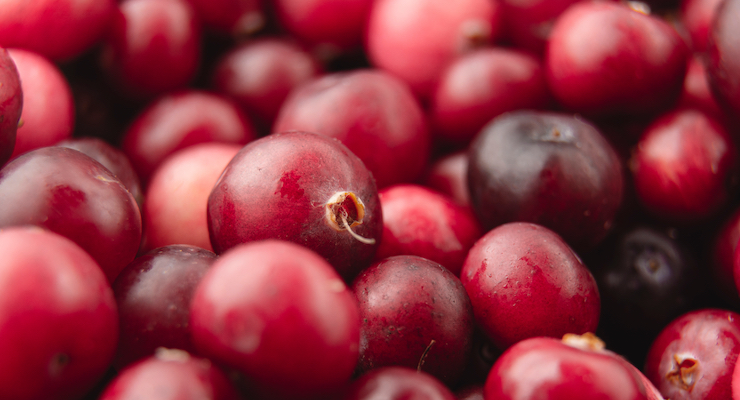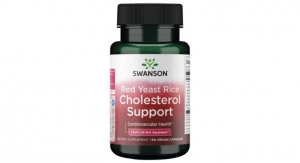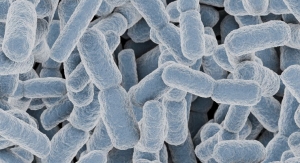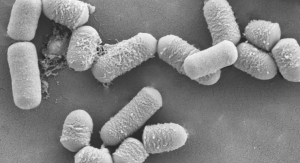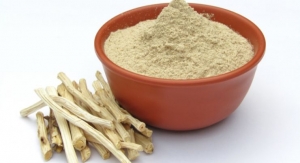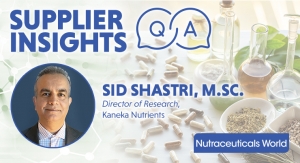03.22.22
Cranberries may offer benefits to heart and blood vessel function, according to a new human clinical study appearing in Food and Function which was supported by the Cranberry Institute, a nonprofit organization which supports cranberry growers and research on the fruit.
The double-blind, randomized, placebo-controlled study recruited 45 healthy men who either consumed a placebo or nine grams of cranberry powder, which is equivalent to one cup of cranberries, per day for a one-month period.
Those consuming cranberry powder experienced significant improvements in flow-mediated dilation (FMD), which is considered a sensitive biomarker of heart and blood vessel function, and a predictive factor in cardiovascular disease. While the study was observational in nature, the authors also identified a number of metabolites present after cranberry supplementation which could have played a role in the mechanism of action behind FMD benefits.
“The increases in polyphenols and metabolites in the bloodstream and the related improvements in flow-mediated dilation after cranberry consumption emphasize the important role cranberries may play in cardiovascular disease prevention,” Dr. Ana Rodriguez-Mateos, senior lecturer in nutrition at the department of nutritional sciences at King’s College London. “The fact that these improvements in cardiovascular health were seen with an amount of cranberries that can be reasonably consumed daily makes cranberry an important fruit in the prevention of cardiovascular disease for the general public.”
According to the authors, low consumption of fruits and vegetables is one of the top modifiable risk factors associated with higher incidence of heart disease worldwide – meanwhile, berries contain polyphenols, which growing evidence continues to link with heart health benefits. Cranberries contain a specific polyphenol called proanthocyanidins, which have distinct properties compared to the polyphenols found in other fruits.
“Our findings provide solid evidence that cranberries can significantly affect vascular health even in people with low cardiovascular risk,” Dr. Christian Heiss, professor of cardiovascular medicine at the University of Surrey, said. “This study further indicates that specific metabolites present in blood after cranberry consumption are related to the beneficial effects.” Specifically, at two hours post-consumption, cranberry usage was related to a significant increase in 13 plasma and 13 urinary metabolites, while 4 plasma and 13 urinary metabolites remained higher after one month of cranberry consumption, compared to the control group.
These results followed an initial pilot study involving five healthy young men, in order to confirm the biological activity of the whole cranberry freeze-dried powder. The pilot confirmed dosing, and concluded that cranberry consumption may increase FMD.
The double-blind, randomized, placebo-controlled study recruited 45 healthy men who either consumed a placebo or nine grams of cranberry powder, which is equivalent to one cup of cranberries, per day for a one-month period.
Those consuming cranberry powder experienced significant improvements in flow-mediated dilation (FMD), which is considered a sensitive biomarker of heart and blood vessel function, and a predictive factor in cardiovascular disease. While the study was observational in nature, the authors also identified a number of metabolites present after cranberry supplementation which could have played a role in the mechanism of action behind FMD benefits.
“The increases in polyphenols and metabolites in the bloodstream and the related improvements in flow-mediated dilation after cranberry consumption emphasize the important role cranberries may play in cardiovascular disease prevention,” Dr. Ana Rodriguez-Mateos, senior lecturer in nutrition at the department of nutritional sciences at King’s College London. “The fact that these improvements in cardiovascular health were seen with an amount of cranberries that can be reasonably consumed daily makes cranberry an important fruit in the prevention of cardiovascular disease for the general public.”
According to the authors, low consumption of fruits and vegetables is one of the top modifiable risk factors associated with higher incidence of heart disease worldwide – meanwhile, berries contain polyphenols, which growing evidence continues to link with heart health benefits. Cranberries contain a specific polyphenol called proanthocyanidins, which have distinct properties compared to the polyphenols found in other fruits.
“Our findings provide solid evidence that cranberries can significantly affect vascular health even in people with low cardiovascular risk,” Dr. Christian Heiss, professor of cardiovascular medicine at the University of Surrey, said. “This study further indicates that specific metabolites present in blood after cranberry consumption are related to the beneficial effects.” Specifically, at two hours post-consumption, cranberry usage was related to a significant increase in 13 plasma and 13 urinary metabolites, while 4 plasma and 13 urinary metabolites remained higher after one month of cranberry consumption, compared to the control group.
These results followed an initial pilot study involving five healthy young men, in order to confirm the biological activity of the whole cranberry freeze-dried powder. The pilot confirmed dosing, and concluded that cranberry consumption may increase FMD.

